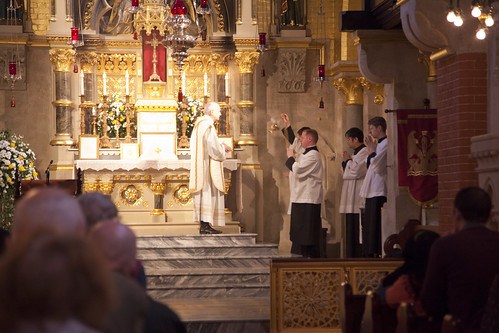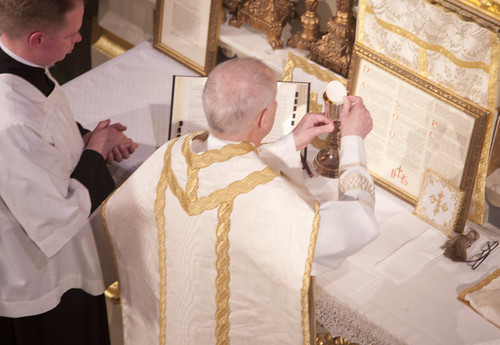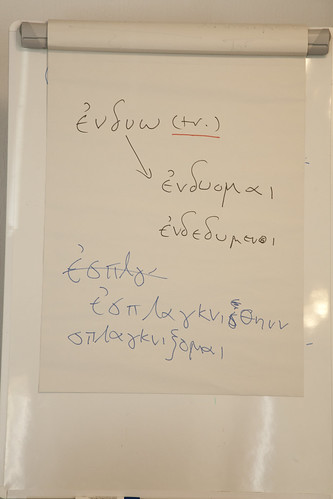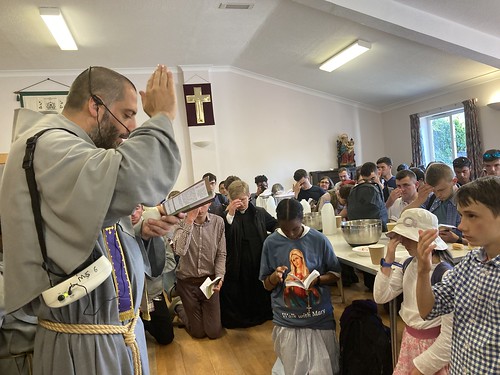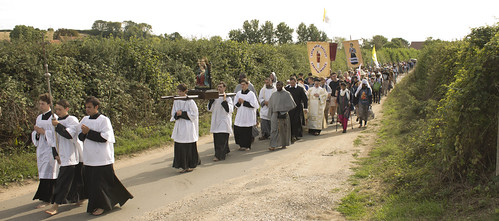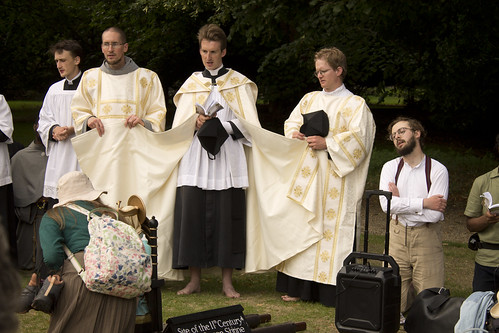Chairman's Blog
Letter to the Tablet, from 1965
 |
| The tenth station: Jesus is stripped. Fr the Church of SS Gregory & Augustine's, Oxford |
Defending the monarchy: with Timothy Flanders
What has the LMS achieved? 1972 edition
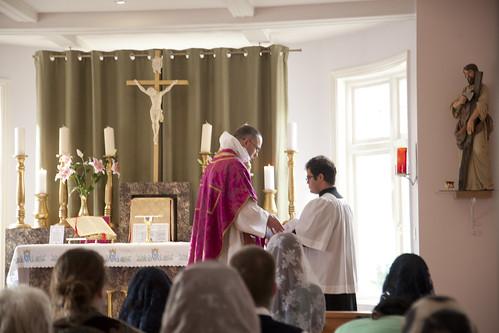 |
| Quietly getting on with it. Mass at the Guild of St Clare spring sewing retreat. |
--------------------------
After reading so many quotations from the Press and so
little, in comparison, about the activities of the L.M.S. it may be asked “but
what actually was the L.M.S. doing all this time? What had it achieved? The
answer is that we did, in our News Letters give our members as much information
regarding the liturgical changes etc. as we could; that we did organize the
saying of Latin Masses both in London and in the country so far as we were
able, that our various Diocesan representatives were in touch with their
bishops trying to persuade them that Latin Masses were wanted, organizing
meetings and Masses where possible. But, in my opinion, our greatest activity
was the mere fact of our existence. An organized body of some two thousand
Catholics, small as that number is, could not be completely ignored by the bishops
and was a constant witness to the existence of a body of people who wanted the
Latin Mass, something that the bishops were constantly denying. It seemed to me
essential to keep the Society in existence if only because of its witness as
representing these many people, the vast majority of whom were not even members
of the Society, who loved and wanted the Latin Mass.
-------------------------
Houghton-Brown goes on to talk about the great triumph of the English Indult in which the LMS had a key role, and as the years have gone by the Society has organised a vast number of Masses, pilgrimages, training events, talks, and so on. Nevertheless, what he says remains true. Even a Una Voce group which can do little of all this by its very existence is a rebuke to those who say that there is no demand for the Traditional Mass, and this is the argument our opponents love to fall back on. Like it or not, when Catholics encounter their ancient liturgy, many of them want it.
Prayers and a Mass of Thanksgiving for the Coronation
The LMS has organised a Mass in thanksgiving for the Coronation on Monday in Corpus Christi Maiden Lane (London with some splendid polyphony: 6:30pm.
V. Dómine salvum fac Regem nostrum Cárolum.
R. Et exáudi nos in die, qua invocavérimus te.
Oremus.
Quǽsumus, omnípotens Deus, ut fámulus tuus Cárolus, Rex noster, quæ tua miseratióne suscépit regni gubernácula, virtútum étiam ómnium percípiat increméntum; quibus decénter ornátus et vitiórum monstra devitáre, [in time of war: hostes superáre,] et ad te qui via, véritas, et vita es, cum regina consorte et prole régia gratiósus valeat perveníre. Per Christum Dóminum nostrum.
R: Amen.
V. O Lord, save Charles our King
All: and hear us in the day that we shall call upon thee.
Let us pray.
We beseech thee, almighty God, that thy servant Charles our King, who through thy mercy has undertaken the government of this realm, may also receive an increase of all virtues. Fittingly adorned with these, may he be able to shun all evildoing, [in time of war: to vanquish his enemies,] and, together with the Queen consort and the royal family, to come by thy grace unto thee who art the way, the truth, and the life. Through Christ our Lord.
R: Amen.
On pomp and ceremoney, by Geoffrey Houghton-Brown
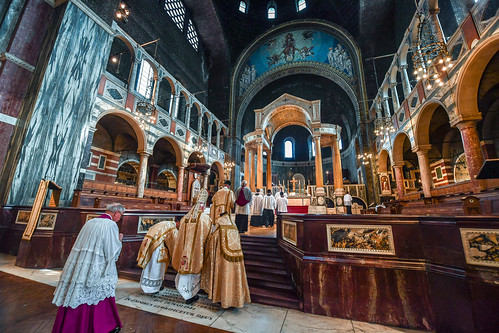 |
| Bishop Campbell processing into the sanctuary of Westminster Cathedral to celebrate Mass for the LMS in 2019. Photo by John Aron. |
Houghton-Brown, an artist and convert, was a founding member of the LMS, at first a Vice President and later Chairman and Diocesan Representative for Westminster. His history of these eight years is quite comprehensive, and every now and then he makes an interesting observation.
Part-time vacancy at the Latin Mass Society
 |
| Mallow Street; our office is at the back of this building. |
Salary: £15,000 - £17,000 per annum
Part-time: 21 hours per week
The Latin Mass Society is recruiting an Office Assistant to work at its office in central London. The Office Assistant will be responsible for supporting the administrative work of the charity, including:
- Office administration
- Membership administration
- Online retail
- Information administration
- Volunteer administration
Support the Latin Mass Society
Feast of St Joseph in Maiden Lane: Mass for the Catholic Police Guild
The remarkable banner was made in 1939. With the post-Conciliar decline in processions (and indeed guilds) it was in storage for many years. Now it is on the wall in Corpus Christi (above the confessional at the back, if you know the church), and emphasises the connection now established between this church and the Guild.
The church was nearly full for this occasion, and the Southwell Consort excelled themselves with Palestrina, Byrd, and L'Heritier.

We have another great musical programme for Mass on Monday 8th, which will be a Mass of thanksgiving for the Coronation (a Votive Mass of the Holy Ghost). The Southwell Consort will sing music by Tye, Taverner, and Sheppard.
These Masses, organised by the Latin Mass Society, take place every Monday at 6:30pm, in Corpus Christi, Maiden Lane, London WC2E 7NB, between Covent Garden and the Strand, continuing an unbroken tradition going back to before the liturgical reform.
LMS Residential Latin Course 2023
It will run Monday 14th August - Saturday 19th August 2023,
As a language teacher, I have found that my students’ scores in grammar tests have had little to no correlation to their scores in broader interpretive skills such as translation. This suggests that explicit knowledge of parts of the language is a separate beast from the actual ability to use and understand the language.
... meaningful activity is essential to language learning, because making form-meaning connections is the basis of learning a language. Any activity which does not genuinely engage with meaning is missing a crucial element. In order to associate all the various words, phrases, grammar, and syntax with their meaning, we need to encounter them many times in contexts where their meaning matters.
Continental Synodal Reports and the TLM
Europe (pdf)
67. From a fundamental point of view, it is possible to detect the link between Church and liturgy, between ecclesiology and the theology of liturgy: The liturgical dimension in the Church is a place of strong tensions. These tensions are part of a deeper tension of an ecclesiological nature. Ecclesiological tension often arises from a vision of the Church based on one’s own expectations (Italian language working group). In this context, the tensions and sufferings concerning the ancient form of the Roman liturgy should be understood, with explicit references by France, England and Wales, and Nordic countries to the pre-conciliar liturgy according to the Missal of 1962.
North America (pdf)
27. Some participants in the synodal process reported on the profound sense of suffering of those prevented from receiving the Eucharist. While there are a variety of reasons for this reality, perhaps preeminent among them is Catholics who are divorced and remarried without an annulment, and others whose objective situation in life contradicts the beliefs and teachings of the Church. Additionally, some delegates spoke of those wounded by the limitations placed on the pre-conciliar Latin rite. Unfortunately, liturgy is not always experienced as unifying. “We could find our unity in common prayer, but liturgy is one of the things that is divisive in the Church and we must break through that” (Session X Group 18).


.png)
